The pros of eating in bed
Ah, eating in bed – the ultimate indulgence. There are so many reasons why this cosy activity can be a true game-changer in your life. For one thing, it's a great way to unwind after a long day. There's something about snacking in bed and watching TV (or watching Netflix) that feels like a delicious rebellion against the rules of society (society called the dining table) – after all, we've been taught since childhood that just like eating and sleeping, food and beds don't mix. But who cares about rules when you're wrapped up in blankets with a plate of nachos?
Another pro of eating in bed is the sheer convenience of it all. No need to get up and go to the kitchen – you've got everything you need right there within arm's reach. And if you're feeling particularly lazy, you can even order food delivery straight to your bed. Plus, eating in bed can be a great way to multitask – catch up on your favourite show, read a book, or even get some work done, all while satisfying your hunger pangs.
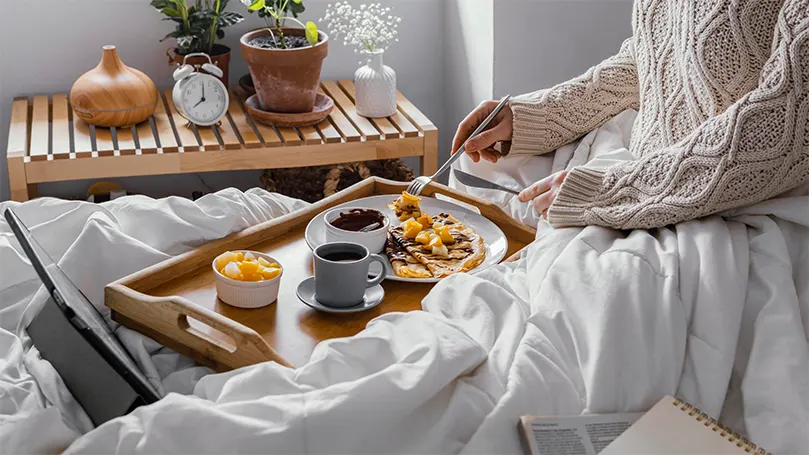
But perhaps the best thing about eating in bed is the pure pleasure of it. There's something about the combination of comfort, cosiness, and delicious food that creates an experience that's greater than the sum of its parts. It's like you're wrapping yourself up in a warm, cosy hug that happens to taste like pizza. What's not to love?
The cons of eating in bed
While there are definitely some appealing aspects to eating in bed, there are also some downsides to consider.
For one thing, it's not exactly the most hygienic practice. Let's face it, crumbs and spills are pretty much inevitable when you're snacking in bed. Not only can this lead to unpleasant surprises like finding a stale chip under your pillow, but it can also attract unwanted guests like ants and other critters – or it may even become a breeding ground for bacteria and yeast.
Another con of eating in bed is the potential for discomfort. Sure, it might feel cosy and indulgent at first, but after a while, you might start to notice that your neck is cramping from hunching over your plate, or that your stomach feels uncomfortably full from eating in a horizontal position. Plus, if you're prone to acid reflux or heartburn, eating in bed can make those symptoms worse.
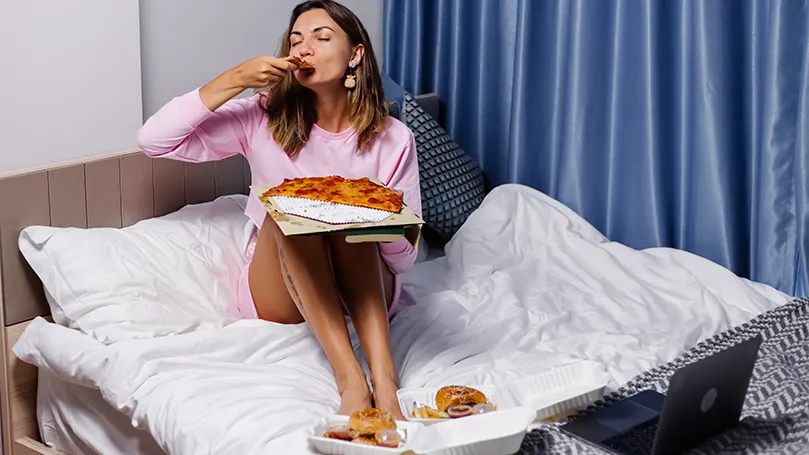
Finally, there's the risk of ruining your bedding or furniture. Even if you're the most careful eater in the world, accidents can happen – a rogue drip of sauce, a crumb that falls between the cushions, or a spilt drink can all leave unsightly stains that are tough to get out. And if you're eating in bed frequently, those stains can really add up over time.
How to eat in bed with no regrets
If you've decided to throw caution to the wind and indulge in some bed-bound snacking, here are some fun and creative tips and tricks to make the experience as enjoyable as possible:
Invest in a lap desk
One of the biggest challenges of eating in bed is finding a stable surface to balance your plate and utensils. A lap desk can make all the difference, providing a flat and sturdy surface that you can adjust to your preferred angle. Plus, many lap desks come with built-in cup holders, so you can sip your favourite beverage without worrying about spills.
Stick to finger foods
Avoid the mess and hassle of utensils altogether by sticking to finger-friendly snacks like chips, popcorn, grapes, or bite-sized candies. Bonus points for foods that won't leave residue on your hands, like pretzel sticks or cheese cubes.
Use a serving tray
If you're eating a full meal in bed, a serving tray can help keep everything organized and in one place. Plus, it can add a touch of elegance to your snacking experience – who says you can't have a fancy dinner party for one in bed?
Bring in some entertainment
Eating in bed can be a great opportunity to catch up on your favourite show or read a book. Just make sure to position your device or book in a way that doesn't interfere with your snacking.
Embrace the mess
If you're feeling daring, you can always embrace the messiness of eating in bed and make it a fun part of the experience. Set up some paper towels or napkins within arm's reach, and revel in the joy of getting a little messy.
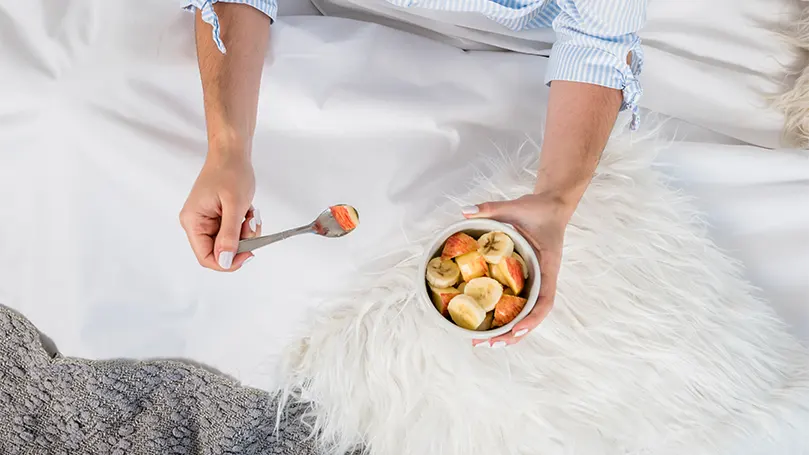
Should you be eating before bed?
The idea of eating before bed is a contentious topic, with some experts arguing that it can lead to weight gain and disrupted sleep hygiene, while others maintain that it's perfectly fine as long as you choose the right foods and eat in moderation.
On the one hand, eating too much or consuming meals that are high in fat, sugar, or caffeine can make it harder for your body to wind down for sleep. Your digestive system may be working overtime, causing discomfort and even acid reflux. Additionally, high levels of sugar or caffeine in the bloodstream can make it more difficult to fall asleep or stay asleep throughout the night.
On the other hand, eating a small meal before bed can actually have some benefits. For one thing, it can help stabilize blood sugar levels, which can prevent you from waking up in the middle of the night feeling hungry. Certain foods, such as complex carbohydrates or proteins, can also promote the production of serotonin and melatonin, hormones that can help you feel calm and relaxed.
Ultimately, the decision to eat before bed will depend on your individual needs and preferences.
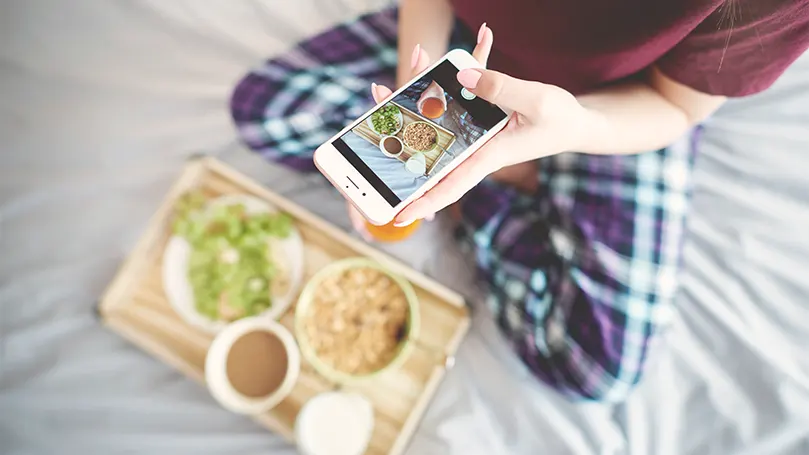
Conclusion
So there you have it – the pros, cons, and tips for enjoying a snack in the comfort of your bed. Whether you're a die-hard bed eater or a cautious sceptic, there's no denying the simple pleasure of munching on your favourite treat while snuggled up under the covers. Just remember to keep it balanced, be mindful of your portions, and above all, enjoy every delicious bite!

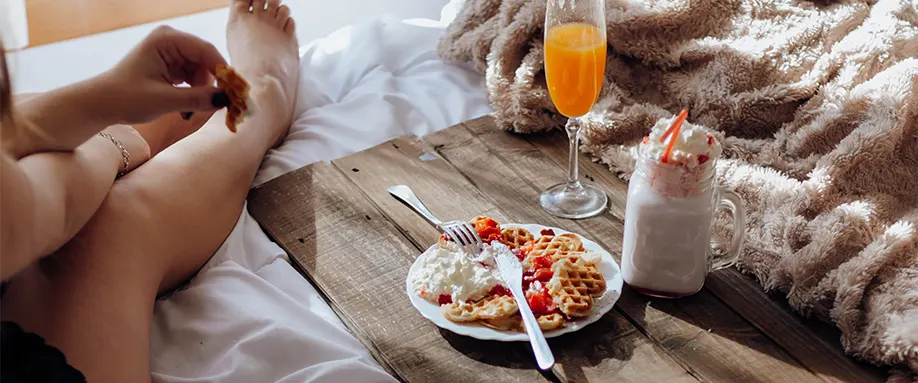











There are no comments yet
"*" indicates required fields